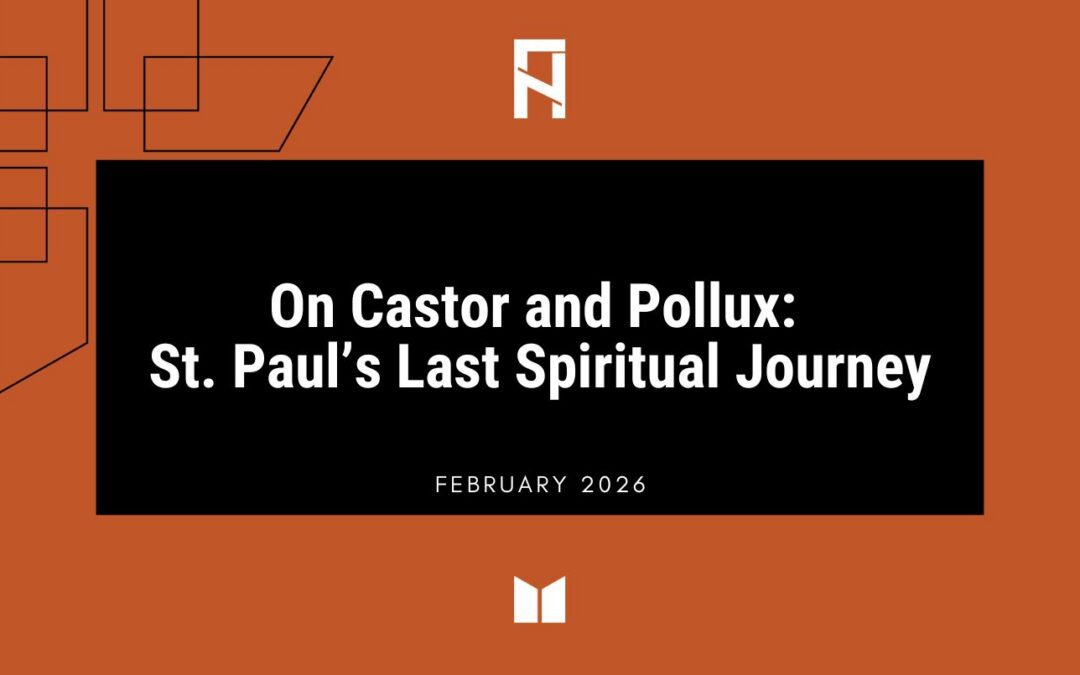Maybe you’ve been hurt or exploited by a counterfeit Christian and your faith was shaken. Or perhaps your loved one is facing that now. Paul knew Timothy also would be exposed to this in the church, and he wanted to prepare and protect him with this advice.

By Patrick Morley
Founder & Executive Chairman
Winter Park, Florida
For several weeks on the blog and in the Man in the Mirror Bible study, we’ve been looking at the lives of Paul and Timothy through the letter of 2 Timothy.
Paul is writing from a prison cell in Rome back to Ephesus, where Timothy, 10-15 years his junior, is building the church. They have a close personal and professional relationship, having served together in ministry for many years by this time. In fact, Paul said of Timothy: “I have no one else like him” (Philippians 2:20a). They have great admiration and respect for each other, but also great affection.
As a result, in 2 Timothy 3, Paul is writing to Timothy from a place of concern. He knows Timothy is going to be exposed to certain kinds of people, and he doesn’t want to see his faith waver or get bruised in the process. He writes:
But mark this: There will be terrible times in the last days. People will be lovers of themselves, lovers of money, boastful, proud, abusive, disobedient to their parents, ungrateful, unholy, without love, unforgiving, slanderous, without self-control, brutal, not lovers of the good, treacherous, rash, conceited, lovers of pleasure rather than lovers of God—having a form of godliness but denying its power. Have nothing to do with such people.
They are the kind who worm their way into homes and gain control over gullible women, who are loaded down with sins and are swayed by all kinds of evil desires, always learning but never able to come to a knowledge of the truth. Just as Jannes and Jambres opposed Moses, so also these teachers oppose the truth. They are men of depraved minds, who, as far as the faith is concerned, are rejected. But they will not get very far because, as in the case of those men, their folly will be clear to everyone. (2 Timothy 3:1-9)
Who Is Paul Talking About?
Paul starts out by warning Timothy of what comes in the “last days,” which has a different connotation than you might think.
[click_to_tweet tweet=”Paul knows Timothy will be exposed to certain kinds of people, and he doesn’t want to see his faith waver or get bruised in the process.” quote=”Paul knows Timothy will be exposed to certain kinds of people, and he doesn’t want to see his faith waver or get bruised in the process.”]
We know that with God, a day is like a thousand years and a thousand years are like a day (2 Peter 3:8). The perspective of time here is different than ours. Because of this, it’s theologically well accepted that “last days” refers to the time between the first and second coming of Christ.
You and I are living in the last days, and Paul and Timothy were as well. When Paul is warning him of what he will experience, then, it’s imminent.
The next thing we realize from the text is that Paul is not talking about the pagan world. He is talking about those who are part of the visible church—people who profess faith in Christ but deny the power of the Holy Spirit.
It’s a counterfeit Christianity, where instead of being there to follow Jesus, they are there for personal gain. Instead of being lovers of God, they are lovers of themselves, of money, and of pleasure.
Now, if we’re honest, that describes all of us some of the time. We fail, we repent, and by God’s grace, we grow.
But it also describes some of us all of the time, and that’s who Paul is talking about in this passage—unrepentant people in the church who have ulterior motives for being there. Counterfeit Christians.
Once when I was speaking in South Carolina, I was talking with a man afterward who had church hurt. He was a young man, like Timothy, but he hadn’t yet met a Paul who could guide him and tell him what to steer clear of or be on the lookout for.
In need of a vehicle, he’d recently been sold a used car by a deacon in his church. A short time later, he found out it was completely rusted out on the underside. The deacon had defrauded him. Although the deacon had a “form of godliness,” he was a lover of money and not a lover of this young man. He used his position of spiritual authority in the church for his own personal gain.
Who Is Paul NOT Talking About?
Paul is not saying to avoid sinners outside the church. We see this clearly in a different letter, where he addresses some of the same ideas that he’s addressing in these verses of 2 Timothy:
I wrote to you in my letter not to associate with sexually immoral people—not at all meaning the people of this world who are immoral, or the greedy and swindlers, or idolaters. In that case you would have to leave this world. But now I am writing to you that you must not associate with anyone who claims to be a brother or sister but is sexually immoral or greedy, an idolater or slanderer, a drunkard or swindler. Do not even eat with such people. What business is it of mine to judge those outside the church? (1 Corinthians 5:9-12a, emphasis added)
We can be certain then that when Paul says, “Have nothing to do with such people,” (2 Timothy 3:5b), he’s not at all talking about sinful people in the world.
[click_to_tweet tweet=”You can’t be salt and light if you are not ever in the places where sinners are.” quote=”You can’t be salt and light if you are not ever in the places where sinners are.”]
The distinction is important to understand, because you can’t be an ambassador for the ministry of reconciliation—a witness to Jesus, salt and light—if you are not ever in the places where sinners are. Jesus didn’t just hang out with the disciples; He made sure to be among tax collectors, prostitutes, and sinners, too.
Paul is talking about avoiding counterfeit Christians—people inside the body of Christ who are using Christianity for personal gain.
The High Disaster Risk of Leadership
Jesus reserved His harshest words not for sinners but for the religious leaders of His day—”Woe to you, teachers of the law and Pharisees, you hypocrites!” (Matthew 23:13a), and “Watch out for the teachers of the law. […] These men will be punished most severely” (Mark 12:38a,40b).
He knew that when leaders and teachers are lovers of themselves and lovers of power instead of lovers of God, the damage they can do is devastating. Their role carries with it a high disaster risk for other believers and for the church.
Paul knew this as well, when he wrote to Timothy: “So also these teachers oppose the truth. They are men of depraved minds, who, as far as the faith is concerned, are rejected” (2 Timothy 3:8b). Paul says to avoid them.
THE BIG IDEA: Steer clear of anyone who is unrepentant and using Christianity for personal gain.
[click_to_tweet tweet=”Jesus knew that when leaders and teachers are lovers of themselves and of power instead of lovers of God, the damage they can do is devastating.” quote=”Jesus knew that when leaders and teachers are lovers of themselves and of power instead of lovers of God, the damage they can do is devastating.”]
You may be a person who has been hurt by another Christian, or even a church leader, and it caused a crisis of faith. Or perhaps you have someone in your life who right now is going through such a crisis of faith because they have been hurt, and you want to know how to counsel and support them.
How do we practically and prayerfully apply Paul’s advice to Timothy?
When to “Have Nothing to Do With” Someone
What does it look like to have nothing to do with these kinds of people who are in the church for personal gain? And how quickly do you act on that if you’ve been wronged?
Scripture provides a guide:
1) First, address the matter one-on-one, when appropriate.
In Matthew 18:15, Jesus says, “If your brother or sister sins, go and point out their fault, just between the two of you. If they listen to you, you have won them over.”
2) If there is no resolution, involve two or three others.
“But if they will not listen, take one or two others along, so that ‘every matter may be established by the testimony of two or three witnesses’” (Matthew 18:16).
3) If there is still no resolution, involve the church.
“If they still refuse to listen, tell it to the church; and if they refuse to listen even to the church, treat them as you would a pagan or a tax collector” (Matthew 18:17).
In other words, at this point, “Have nothing to do with such people.”
4) If there is still no resolution, have nothing to do with them.
We see this process echoed in Titus 3:10: “Warn a divisive person once, and then warn them a second time. After that, have nothing to do with them.”
This form of discipline was recommended in the days of the early church for a reason. It reminds me of the popular phrase, “One bad apple spoils the bunch.” The saying comes from the process that takes place when one apple begins to go bad. As it decays, it emits gases that can be absorbed by others around it. Soon, the other apples will begin to rot as well.
Removing or isolating a counterfeit Christian who is using Christianity for personal gain protects not only the integrity of the message, but also the others in the church from harm.
So although Paul’s advice is severe, we can see its purpose. That said, we still need to pray for wisdom in applying it. I wonder, for example, what happens when that person is your spouse? Or one of your children? There are nuances to Paul’s advice that you will face and need to prayerfully consider.
Practically speaking, at times physical separation is called for, but in other cases, you’re still going to be in the same church and community with these people. But keep your distance. Steer clear. If it’s a familial relationship, don’t withhold love or kick them out of your home, but be more cautious with them, using discernment.
A Greater Purpose
Yes, Paul says to have nothing to do with those who are using Christianity for personal gain—but it doesn’t necessarily mean forever.
In 2 Corinthians 2:6-8, regarding someone who has caused the church grief, Paul writes:
The punishment inflicted on him by the majority is sufficient. Now instead, you ought to forgive and comfort him, so that he will not be overwhelmed by excessive sorrow. I urge you, therefore, to reaffirm your love for him.
When we read, “Have nothing to do with such people,” it doesn’t mean forever. It means while they are unrepentant, continuing to use and exploit others. Hopefully they won’t remain in that state.
For the greater—the greatest—purpose is that they would ultimately come to repentance. And then, Paul says, it’s time to offer forgiveness and comfort.
Here’s my prayer for us:
[click_to_tweet tweet=”Lord, help us to know when it’s time to steer clear—and when it’s time to forgive and comfort.” quote=”Lord, help us to know when it’s time to steer clear—and when it’s time to forgive and comfort.”]
Our dearest Father, give us wisdom to understand how to respond to people who are using Christianity for personal gain, especially when we or our loved ones have been hurt. I pray for healing and repentance.
And Lord, help us understand that some people are like this all of the time, but all of us are like this some of the time, so show us in our own hearts if we have been the ones doing the hurting.
As we encounter each other’s sin, protect our sense of truth and faith, and help us to know when it’s time to steer clear—and when it’s time to forgive and comfort. I ask these things in Jesus’ name. Amen.
♦♦♦
[vc_widget_sidebar sidebar_id=”businesslounge-free-2″]





